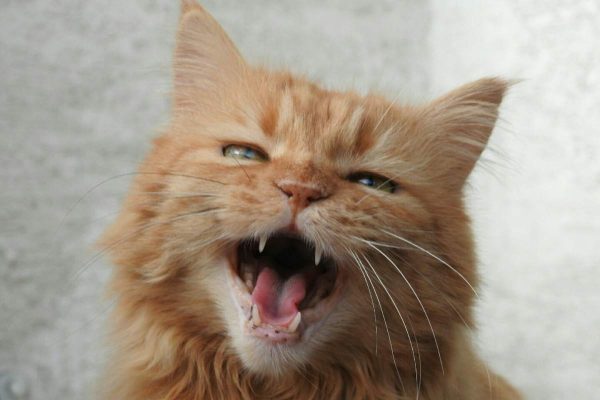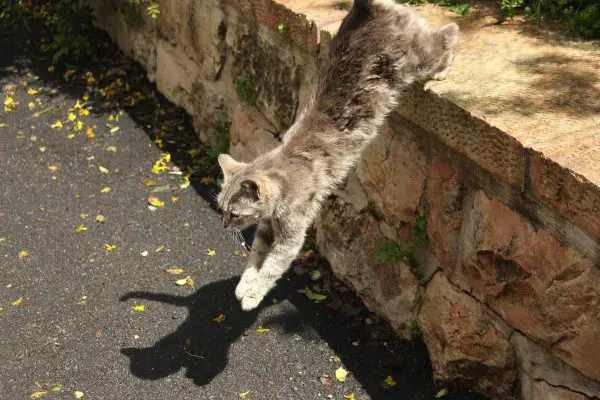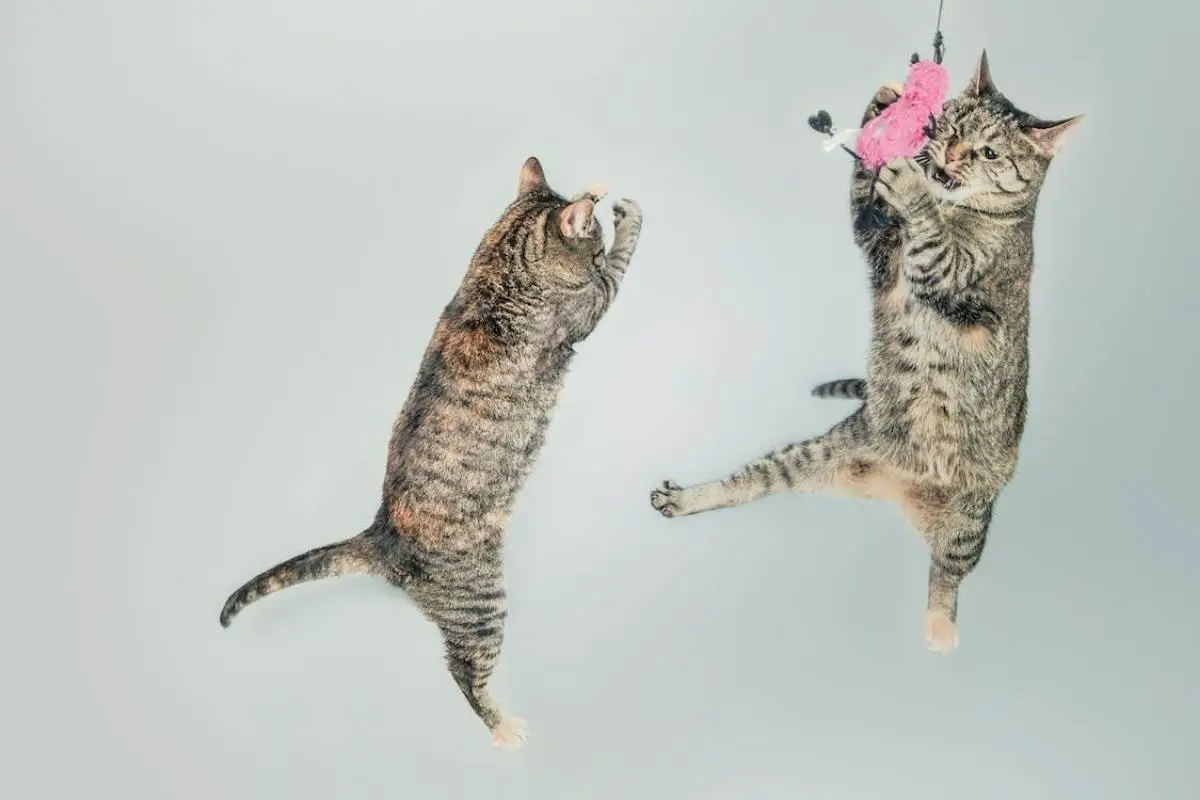Every cat has a different personality, and therefore a different inclination to make sound. Sometimes it’s easy to understand what you cat is saying or asking for, but other times it can be a bit mysterious what the various chirps or meows mean. For example, what does that weird ‘bip’ sound mean when your cat sits down in front of you, or why does it chirp when it leaps onto its favorite chair?
So, why does my cat make a noise when she jumps? Spotting prey, wanting attention, general ‘chattiness, or perhaps discomfort can all be reasons behind this behavior, but it’s usually nothing to be concerned about.
As you read on, you’ll learn more reasons behind why your cat may meow or ‘chirp’ when they jump, and more about cat vocalizations in general and what they mean, as well as what you can do for a cat who is chatty to the point of annoyance.
Bird Chirps
Perhaps you’ve seen your cat at a window, absolutely fixated on a bird or a squirrel. They’re bunched up, their tail is twitching, and they’re making a noise that sort of sounds like a series of chirps. There are a couple theories behind this sound.
One is that your cat is excited by the possibility of getting to hunt and eat, so worked up they can hardly contain themselves, and so they chirp.
It might seem odd for a predator to give away their position by making a sound, so some scientists and cat behaviorists have theorized that the ‘chirping’ sound your cat makes is actually meant to imitate the sounds that birds or rodents make when foraging.
It’s possible that your cat is instinctually making this sound to try and put their prey at ease so it will have a better chance of making a successful kill. Therefore, if your cat seems to wiggle and chirp before their jump, it may be that they feel that they have spotted prey, whether that is a toy up on a counter or table, or your foot or hand.
So if your cat makes a chirping or clicking sound before they jump, it’s likely an instinctual prey response.
Meows and Mews

If your cat isn’t chirping before a jump, but rather is actually meowing at you, it’s likely that your cat is looking for your attention. You may be peacefully scrolling through your phone or working on your computer when all of a sudden you hear a distinct ‘miao’.
Your cat is demanding your notice, and once you look at them, they launch themselves up onto a chair, or onto your lap or your desk. This particular behavior is fairly self-explanatory: your cat wants you to notice their jump.
Whether they want you to turn toward them so they have a better angle to get onto your lap, or they want you to notice just how majestic their leap onto the couch is, your cat wants you to look at them and see what they’re doing.
It may be that they want to show you that they want something, like a treat or a toy, or they’re letting you know that they’re settling down for a nap. Either way, you should take some pleasure in the fact that your cat values your company and attention to a point at which it wants you to notice their accomplishments.
Why Does My Cat Squeak Instead of Meow?
If your cat squeaks when jumping down instead of making traditional meows, it could be due to various reasons. Cats communicate through a range of vocalizations, and squeaking may be a unique expression for your feline friend. This behavior could be influenced by the cat’s individual personality, health issues, or simply its preferred way of communicating.
Some cats develop distinct vocalizations as a means of getting attention or expressing excitement. If you’re concerned about the change in your cat’s vocal patterns, it’s advisable to consult with a veterinarian to rule out any underlying health issues.
Other Sounds
Of course, your cat has more of a vocabulary than just chirps and meows. You may have noticed that your cat actually makes a sound right at the launch of their jump, a sort of ‘hrrup’ noise, for lack of a better adjective.
The best explanation of this sound lies in our own behavior: you yourself may have said “oof” once or twice when getting up out of a chair, or climbing up onto a high step, and your cat’s vocalizations are similar. In older cats, or cats that are on the plumper side, it may require more effort to launch themselves onto a tall object.
Similarly, they may make a sound when they jump down and land, just like we might sigh when we sit down after a long day. There’s no need to be concerned about this odd noise, unless your cat is genuinely having trouble getting up onto higher surfaces.
If it seems like your cat is struggling more than usual, it could be an age-related or weight-related issue that could become a more significant problem. If this seems to be the case, a trip to the veterinarian may be in order to make sure that your cat is at its best.
If your cat yelps or squeaks when he or she jumps or lands from a jump, there may be something wrong. In older cats, arthritis or other types of joint pain caused by general wear and tear over time can by worsened by the impact involved in jumping up to or down from a countertop or chair.
The same goes for joint dysplasia or partial dislocation, which, though more common in older cats, can occur in younger cats of specific breeds like the Maine Coon or the Persian. If your young cat displays any sign of discomfort while jumping, such as limping after the jump or making a yelp or cry when they jump, then you should take them to the vet as soon as possible.
This could be indicative of an injury that requires professional treatment, like a broken bone or a deep sprain. Most likely it will be a problem that can be easily resolved with a wrap and some rest, and your cat will be back to their usual acrobatic self before you know it.
To the Extreme

Most cat owners generally enjoy the interesting sounds that their cats make, and occasionally feel like they can hold entire conversations with their feline companions. However, you may have encountered the problem of your pet being far too talkative to the point of irritation.
If your cat seems to be ‘yelling’ at you all the time, or at specific times of the day or night, you may need to do some extra work to resolve the issue. Here are some common causes, and solutions, for loud cats:
– If your cat seems particularly ‘shout-y’ at night, he or she may need to burn off more energy before bed. Try playing with them more during the day or giving them other activities during waking hours to help them wear themselves out, and this should help them be quieter in the evenings. On the bright side, your cat being noisy before bed is a sign that your cat is a healthy, energetic feline, and that’s definitely a good thing!
– If you have a cat who screams at mealtime, then you should wait to feed them until they are quiet. Feeding them while they’re yelling at you reinforces bad behavior, and trains your cat to be obnoxious to get what they want. Conversely, giving them their dish of food when they’re quiet will train your kitty that being patient and respectful is the better option, and both of your lives will be much more peaceful as a result.
– If your cat meows and causes a ruckus when you leave the house, even if it’s just for a moment, this is likely the result of separation anxiety. Obviously, you can’t avoid leaving the house on occasion, so your best option is to make sure that your cat has places in your home where it can feel comforted and safe, even when you aren’t there. Cozy beds or cat trees may help your cat feel less anxious and may reduce the amount of ‘yelling’ they do.
– If your cat seems to be meowing at absolutely nothing—they aren’t begging for food, they aren’t trying to show you something—it may be time to take your pet to the vet, particularly if your cat is on the older side. Loud meowing, restlessness, and confusion may be a sign of deafness, pain, or cognitive decline. Your vet will be able to tell you more, and give you possible solutions to help your cat feel better.
Conclusion
Cats are surprisingly social creatures at times and will often use their voices to tell you about their comings and goings. Some things are easy to understand, like meowing for treats or for attention, but others, like chirps or mumbles, can be slightly more confusing.
However, it’s safe to say that if your cat makes a little trill before or after a jump, it’s likely that they’re either looking for you to notice their acrobatics, or they’re really putting the effort into their performance.
Of course, if you notice that your cat seems to be showing signs of discomfort or has suddenly started making more sounds than usual, it is always a good idea to consult your vet to make sure that there are no underlying issues—but for the most part, your cat’s chirps and purrs are just part of normal cat behavior, and you shouldn’t be too worried over them.

